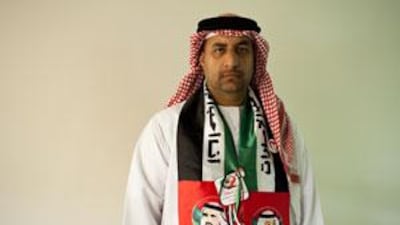Mohammed Jumaa al Hosani, who was moved to join the profession by the shortage of male teachers in state schools, has a strong message for pupils. Mohammed Jumaa al Hosani, the principal of the Abu Dhabi Secondary School, went into teaching because he wanted to pay something back to a country of which he is inordinately fond and proud. He was aware that the UAE was suffering from an acute shortage of teachers, especially males, and he wanted to do his bit to help.
"I started my academic career on October 13, 1991," he says. "Now obviously I've been involved in academics since I was much younger - since I was studying at school," he jokes. He began teaching accounting, economics and management at the Abu Dhabi Schools of Technology, a now-defunct establishment that was originally part of Khalifa bin Zayed School. Slowly gaining prominence there, he became a deputy in the administration, and later principal.
His rise coincided with the school's expansion and its increasing autonomy from Khalifa bin Zayed School. Eventually it broke off to become a separate entity. Mr al Hosani later left to become the principal of Abu Dhabi Secondary School, but he remembers his old campus with fondness. "It produced generations that later went on to have prominent positions in the country, and it had a role in educating them and improving the country, and we even had a role in educating young girls," he says.
His attraction to the teaching profession came from a deep-seated desire to make a significant contribution to society. "I wanted to be productive. Working in education keeps you updated with all the concerns of people, and it feels more productive than other management positions. "And I was trying to say 'thank you' to this country which has given us everything. We were suffering from a lack of teachers, particularly male teachers."
The severe shortage of Emirati men teaching in state schools persists. In 2006, only 48 out of 724 male teachers in government boys' schools in Dubai were Emirati, representing only 6.6 per cent. The number was higher for the nation as a whole at 11 per cent but compared with girls' schools, in which Emiratis made up 74.9 per cent of the teaching staff in 2006, the number is strikingly low. Poor pay and a lack of status are part of the reason why boys do not become teachers, according to Dr Natasha Ridge, a researcher at the Dubai School of Government.
The issue has caught the attention of policymakers who are trying to attract more local boys to the profession. The Emirates Foundation is currently surveying young people on their career ambitions in an effort to find out why more of them are not going into teaching. Despite the shortage of male teachers, Mr al Hosani is positive about public schools. "All the leaders of this country studied in government schools, like the ministers and decision-makers in the country. The schools produce a lot of leaders and we have the best curriculums."
He is also unequivocal on the debate that has arisen over the importance of English in schools in a country eager to hold on to its Arabic traditions. "What we can do now is strengthen the English language." he says. "It is the language of the age." Mastering it would help produce the next generation of Emirati recruits ready to participate in the country's industries, he believes. His message for the country's students is equally clear. "They have to grab on to these chances and opportunities that the country offers them, especially when it comes to the different fields in education. They must diversify, work hard, and struggle."
Like him, "they must pay back the country's favours to them". kshaheen@thenational.ae


